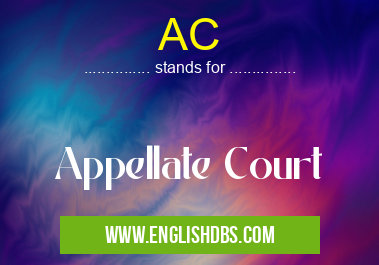What does AC mean in LEGISLATION
An acronym is an abbreviation formed from the initial letters of a phrase or word. One such acronym in government is AC, which stands for Appellate Court. A court of appeals (also known as an appellate court ) is a court created by a legislature to review decisions made by lower courts, such as superior or district courts. An appeal is a legal process that allows parties to challenge decisions made by lower courts and seek relief from those decisions.

AC meaning in Legislation in Governmental
AC mostly used in an acronym Legislation in Category Governmental that means Appellate Court
Shorthand: AC,
Full Form: Appellate Court
For more information of "Appellate Court", see the section below.
Essential Questions and Answers on Appellate Court in "GOVERNMENTAL»LEGISLATION"
What is an Appellate Court?
An appellate court is a court of law that hears appeals from trial courts. It reviews the decisions made by trial courts to determine if they are legally correct. The appellate court can also decide questions related to the interpretation of laws.
How does an Appellate Court work?
An appellate court works by reviewing the trial court's decision and determining whether legal errors were made in reaching its conclusion. The party that lost at the trial level may file an appeal with the appellate court, which will then review the lower court's ruling and issue its own decision based on the evidence and arguments presented.
What are the differences between Appellate Courts and trial courts?
The main difference between an appellate court and a trial court is that an appellate court does not hear direct evidence or witness testimony; it only reviews documents, such as briefs, motions, and transcripts from previous proceedings to determine if any errors were made in reaching the trial court’s decision. Another difference is that appellate courts do not make findings of fact; instead, they focus on determining if errors of law have been committed.
What kind of issues do Appellate Courts consider?
Appellate Courts typically consider legal issues related to a prior ruling on a case, such as jurisdictional matters, procedural errors, evidentiary standards, or matters relating to judgemental discretion exercised by a lower court judge. Additionally, appeals may be raised regarding the interpretation of statutes or constitutional provisions that apply to the case.
How quickly can I expect a ruling from an Appellate Court?
Decisions from an appellate court can take anywhere from several months to over a year depending upon how complex the case is and what other cases are in front of them for consideration. Generally speaking though you can expect some type of outcome within 6-12 months.
Can I appeal more than once after going before an Appellate Court?
Yes you can appeal more than once after going before an appellate court depending on which jurisdiction you reside in . Depending on your particular state laws , you may be able to bring your case up multiple times for another hearing until all appeals have been exhausted.
Final Words:
In conclusion, AC stands for Appellate Court - which refers to a higher tier system within government where cases are heard on appeal after they have been decided at the lower tier (trial level) courts below it. The purpose behind having an Appellate Court in place is so that any wrongful verdicts can be corrected during this stage rather than go through potentially lengthy proceedings further down in order to ensure justice prevails at all times.
AC also stands for: |
|
| All stands for AC |
